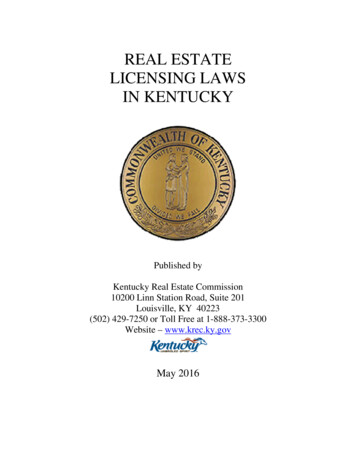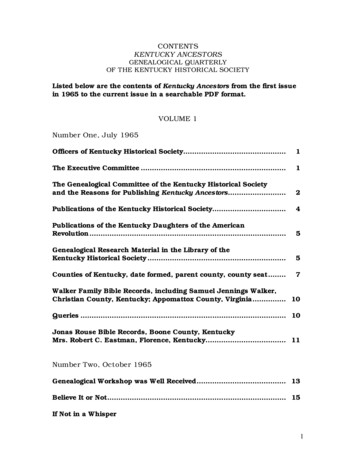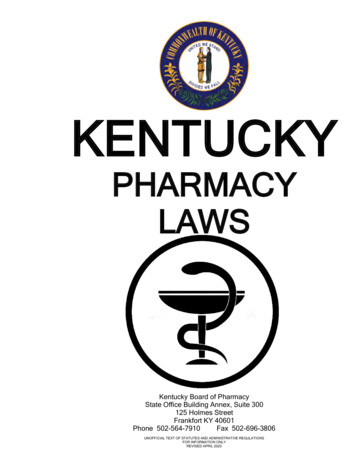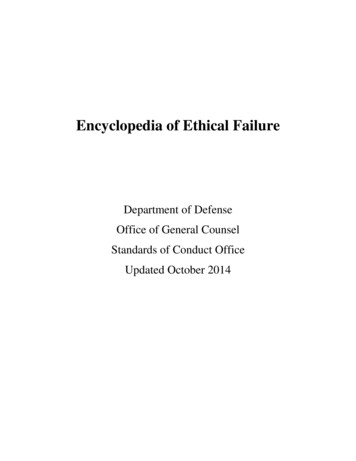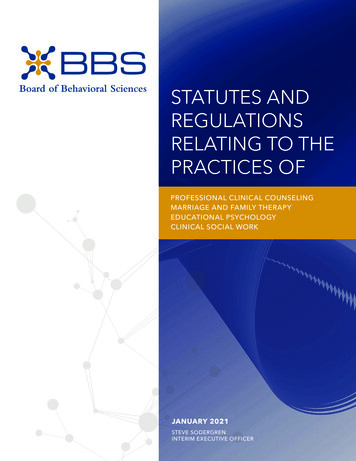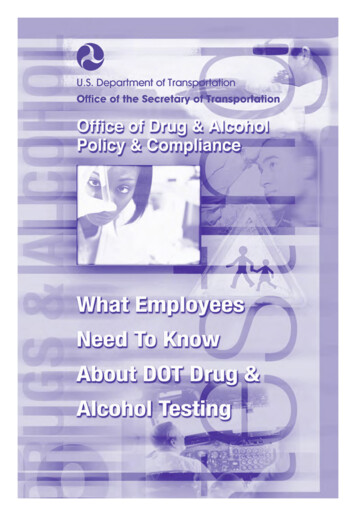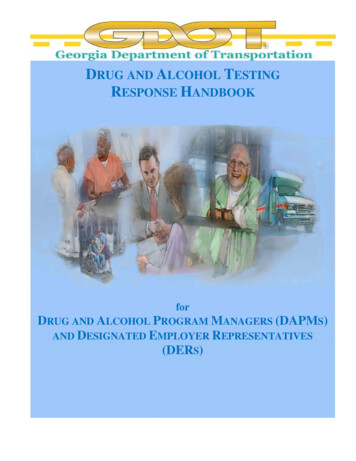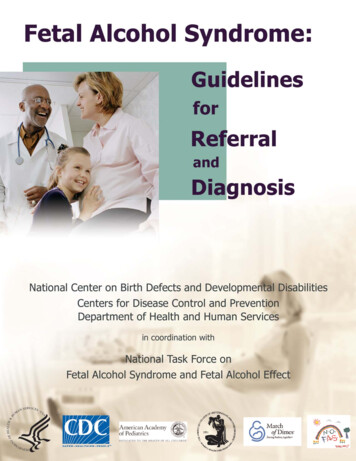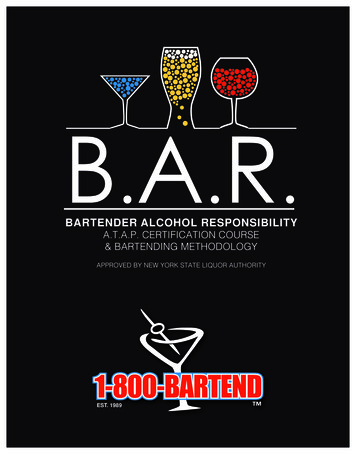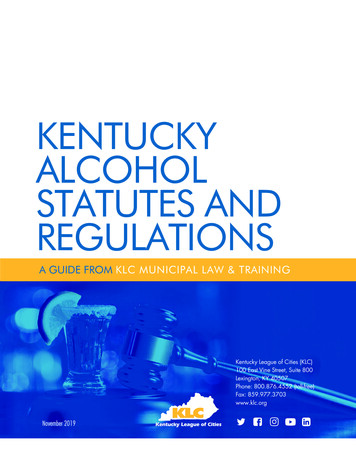
Transcription
KENTUCKYALCOHOLSTATUTES ANDREGULATIONSA GUIDE FROM KLC MUNICIPAL LAW & TRAININGKentucky League of Cities (KLC)100 East Vine Street, Suite 800Lexington, KY 40507Phone: 800.876.4552 (toll-free)Fax: 859.977.3703www.klc.orgNovember 2019
KENTUCKY LEAGUE OF CITIESMUNICIPAL LAW & TRAININGKENTUCKY ABC LAWS - INTRODUCTIONThe Kentucky League of Cities Department of Municipal Law and Training is proud to respond to the needsof our members by compiling this compendium of Kentucky alcohol beverage statutes and regulations. Thegoal of this publication is to provide an eBook that can be easily updated in the coming years with any and allstatutory and regulatory changes in the field of alcohol beverage control. As always, should you have any specificquestions, feel free to contact the KLC Department of Municipal Law and Training at 800.876.4552.2
KENTUCKY LEAGUE OF CITIESMUNICIPAL LAW & TRAININGCHAPTER 241 – ALCOHOLIC BEVERAGES;ADMINISTRATION AND CONTROL241.010 Definitions for KRS Chapters 241 to 244As used in KRS Chapters 241 to 244, unless the context requires otherwise:(1) “Alcohol” means ethyl alcohol, hydrated oxide of ethyl or spirit of wine, from whatever source or bywhatever process it is produced;(2) “Alcoholic beverage” means every liquid, solid, powder, or crystal, whether patented or not, containingalcohol in an amount in excess of more than one percent (1%) of alcohol by volume, which is fit forbeverage purposes. It includes every spurious or imitation liquor sold as, or under any name commonlyused for, alcoholic beverages, whether containing any alcohol or not. It does not include the followingproducts:(a)Medicinal preparations manufactured in accordance with formulas prescribed by the United StatesPharmacopoeia, National Formulary, or the American Institute of Homeopathy;(b)Patented, patent, and proprietary medicines;(c)Toilet, medicinal, and antiseptic preparations and solutions;(d)Flavoring extracts and syrups;(e)Denatured alcohol or denatured rum;(f)Vinegar and preserved sweet cider;(g)Wine for sacramental purposes; and(h)Alcohol unfit for beverage purposes that is to be sold for legitimate external use;(3) (a) “Alcohol vaporizing device” or “AWOL device” means any device, machine, or process that mixesliquor, spirits, or any other alcohol product with pure oxygen or by any other means produces avaporized alcoholic product used for human consumption;(b)“Alcohol vaporizing device” or “AWOL device” does not include an inhaler, nebulizer, atomizer,or other device that is designed and intended by the manufacturer to dispense a prescribed orover-the-counter medication or a device installed and used by a licensee under this chapter todemonstrate the aroma of an alcoholic beverage;(4) “Automobile race track” means a facility primarily used for vehicle racing that has a seating capacity ofat least thirty thousand (30,000) people;(5) “Bed and breakfast” means a one (1) family dwelling unit that:(a)Has guest rooms or suites used, rented, or hired out for occupancy or that are occupied forsleeping purposes by persons not members of the single-family unit;3
KENTUCKY LEAGUE OF CITIESMUNICIPAL LAW & TRAINING(b)Holds a permit under KRS Chapter 219; and(c)Has an innkeeper who resides on the premises or property adjacent to the premises during periodsof occupancy;(6) “Board” means the State Alcoholic Beverage Control Board created by KRS 241.030;(7) “Bottle” means any container which is used for holding alcoholic beverages for the use and sale ofalcoholic beverages at retail;(8) “Brewer” means any person who manufactures malt beverages or owns, occupies, carries on, works, orconducts any brewery, either alone or through an agent;(9) “Brewery” means any place or premises where malt beverages are manufactured for sale, and includesall offices, granaries, mash rooms, cooling rooms, vaults, yards, and storerooms connected with thepremises; or where any part of the process of the manufacture of malt beverages is carried on; or whereany apparatus connected with manufacture is kept or used; or where any of the products of brewing orfermentation are stored or kept;(10) “Building containing licensed premises” means the licensed premises themselves and includes the land,tract of land, or parking lot in which the premises are contained, and any part of any building connectedby direct access or by an entrance which is under the ownership or control of the licensee by leaseholdings or ownership;(11) “Caterer” means a person operating a food service business that prepares food in a licensed andinspected commissary, transports the food and alcoholic beverages to the caterer’s designated andinspected banquet hall or to an agreed location, and serves the food and alcoholic beverages pursuant toan agreement with another person;(12) “Charitable organization” means a nonprofit entity recognized as exempt from federal taxation undersection 501(c) of the Internal Revenue Code (26 U.S.C. sec. 501(c)) or any organization having beenestablished and continuously operating within the Commonwealth of Kentucky for charitable purposesfor three (3) years and which expends at least sixty percent (60%) of its gross revenue exclusively forreligious, educational, literary, civic, fraternal, or patriotic purposes;(13) “Cider” means any fermented fruit-based beverage containing seven percent (7%) or more alcohol byvolume and includes hard cider and perry cider;(14) “City administrator” means city alcoholic beverage control administrator;(15) “Commercial airport” means an airport through which more than five hundred thousand (500,000)passengers arrive or depart annually;(16) “Commercial quadricycle” means a vehicle equipped with a minimum of ten (10) pairs of fully operativepedals for propulsion by means of human muscular power exclusively and which:(a)Has four (4) wheels;(b)Is operated in a manner similar to that of a bicycle;(c)Is equipped with a minimum of thirteen (13) seats for passengers;4
KENTUCKY LEAGUE OF CITIESMUNICIPAL LAW & TRAINING(d)Has a unibody design;(e)Is equipped with a minimum of four (4) hydraulically operated brakes;(f)Is used for commercial tour purposes; and(g)Is operated by the vehicle owner or an employee of the owner;(17) “Commissioner” means the commissioner of the Department of Alcoholic Beverage Control;(18) “Convention center” means any facility which, in its usual and customary business, provides seatingfor a minimum of one thousand (1,000) people and offers convention facilities and related servicesfor seminars, training and educational purposes, trade association meetings, conventions, or civic andcommunity events or for plays, theatrical productions, or cultural exhibitions;(19) “Convicted” and “conviction” means a finding of guilt resulting from a plea of guilty, the decision ofa court, or the finding of a jury, irrespective of a pronouncement of judgment or the suspension of thejudgment;(20) “County administrator” means county alcoholic beverage control administrator;(21) “Department” means the Department of Alcoholic Beverage Control;(22) “Dining car” means a railroad passenger car that serves meals to consumers on any railroad or Pullmancar company;(23) “Discount in the usual course of business” means price reductions, rebates, refunds, and discountsgiven by wholesalers to distilled spirits and wine retailers pursuant to an agreement made at the timeof the sale of the merchandise involved and are considered a part of the sales transaction, constitutingreductions in price pursuant to the terms of the sale, irrespective of whether the quantity discount was:(a)Prorated and allowed on each delivery;(b)Given in a lump sum after the entire quantity of merchandise purchased had been delivered; or(c)Based on dollar volume or on the quantity of merchandise purchased;(24) “Distilled spirits” or “spirits” means any product capable of being consumed by a human being whichcontains alcohol in excess of the amount permitted by KRS Chapter 242 obtained by distilling, mixedwith water or other substances in solution, except wine, hard cider, and malt beverages;(25) “Distiller” means any person who is engaged in the business of manufacturing distilled spirits at anydistillery in the state and is registered in the Office of the Collector of Internal Revenue for the UnitedStates at Louisville, Kentucky;(26) “Distillery” means any place or premises where distilled spirits are manufactured for sale, and which areregistered in the office of any collector of internal revenue for the United States. It includes any UnitedStates government bonded warehouse;(27) “Distributor” means any person who distributes malt beverages for the purpose of being sold at retail;5
KENTUCKY LEAGUE OF CITIESMUNICIPAL LAW & TRAINING(28) “Dry” means a territory in which a majority of the electorate voted to prohibit all forms of retail alcoholsales through a local option election held under KRS Chapter 242;(29) “Election” means:(a)An election held for the purpose of taking the sense of the people as to the application ordiscontinuance of alcoholic beverage sales under KRS Chapter 242; or(b)Any other election not pertaining to alcohol;(30) “Horse racetrack” means a facility licensed to conduct a horse race meeting under KRS Chapter 230;(31) “Hotel” means a hotel, motel, or inn for accommodation of the traveling public, designed primarily toserve transient patrons;(32) “Investigator” means any employee or agent of the department who is regularly employed and whoseprimary function is to travel from place to place for the purpose of visiting licensees, and any employeeor agent of the department who is assigned, temporarily or permanently, by the commissioner toduty outside the main office of the department at Frankfort, in connection with the administration ofalcoholic beverage statutes;(33) “License” means any license issued pursuant to KRS Chapters 241 to 244;(34) “Licensee” means any person to whom a license has been issued, pursuant to KRS Chapters 241 to 244;(35) “Limited restaurant” means:(a)A facility where the usual and customary business is the preparation and serving of meals toconsumers, which has a bona fide kitchen facility, which receives at least seventy percent (70%) ofits food and alcoholic beverage receipts from the sale of food, which maintains a minimum seatingcapacity of fifty (50) persons for dining, which has no open bar, which requires that alcoholicbeverages be sold in conjunction with the sale of a meal, and which is located in a wet or moistterritory under KRS 242.1244; or(b)A facility where the usual and customary business is the preparation and serving of meals toconsumers, which has a bona fide kitchen facility, which receives at least seventy percent (70%) ofits food and alcoholic beverage receipts from the sale of food, which maintains a minimum seatingcapacity of one hundred (100) persons of dining, and which is located in a wet or moist territoryunder KRS 242.1244;(36) “Local administrator” means a city alcoholic beverage administrator, county alcoholic beverageadministrator, or urban-county alcoholic beverage control administrator;(37) “Malt beverage” means any fermented undistilled alcoholic beverage of any name or description,manufactured from malt wholly or in part, or from any substitute for malt, and includes weak cider;(38) “Manufacture” means distill, rectify, brew, bottle, and operate a winery;(39) “Manufacturer” means a winery, distiller, rectifier, or brewer, and any other person engaged in theproduction or bottling of alcoholic beverages;6
KENTUCKY LEAGUE OF CITIESMUNICIPAL LAW & TRAINING(40) “Minor” means any person who is not twenty-one (21) years of age or older;(41) “Moist” means a territory in which a majority of the electorate voted to permit limited alcohol salesby any one (1) or a combination of special limited local option elections authorized by KRS 242.022,242.123, 242.1238, 242.124, 242.1242, 242.1243, 242.1244, or 242.1292;(42) “Population” means the population figures established by the federal decennial census for a census yearor the current yearly population estimates prepared by the Kentucky State Data Center, Urban StudiesCenter of the University of Louisville, Louisville, Kentucky, for all other years;(43) “Premises” means the land and building in and upon which any business regulated by alcoholicbeverage statutes is operated or carried on. “Premises” shall not include as a single unit two (2) ormore separate businesses of one (1) owner on the same lot or tract of land, in the same or in differentbuildings if physical and permanent separation of the premises is maintained, excluding employee accessby keyed entry and emergency exits equipped with crash bars, and each has a separate public entranceaccessible directly from the sidewalk or parking lot. Any licensee holding an alcoholic beverage licenseon July 15, 1998, shall not, by reason of this subsection, be ineligible to continue to hold his or herlicense or obtain a renewal, of the license;(44) “Primary source of supply” or “supplier” means the distiller, winery, brewer, producer, owner of thecommodity at the time it becomes a marketable product, bottler, or authorized agent of the brandowner. In the case of imported products, the primary source of supply means either the foreignproducer, owner, bottler, or agent of the prime importer from, or the exclusive agent in, the UnitedStates of the foreign distiller, producer, bottler, or owner;(45) “Private club” means a nonprofit social, fraternal, military, or political organization, club, or entitymaintaining or operating a club room, club rooms, or premises from which the general public isexcluded;(46) “Public nuisance” means a condition that endangers safety or health, is offensive to the senses, orobstructs the free use of property so as to interfere with the comfortable enjoyment of life or propertyby a community or neighborhood or by any considerable number of persons;(47) “Qualified historic site” means:(a)A contributing property with dining facilities for at least fifty (50) persons at tables, booths, or barswhere food may be served within a commercial district listed in the National Register of HistoricPlaces;(b)A site that is listed as a National Historic Landmark or in the National Register of Historic Placeswith dining facilities for at least fifty (50) persons at tables, booths, or bars where food may beserved;(c)A distillery which is listed as a National Historic Landmark and which conducts souvenir retailpackage sales under KRS 243.0305; or(d)A not-for-profit or nonprofit facility listed on the National Register of Historic Places;(48) “Rectifier” means any person who rectifies, purifies, or refines distilled spirits or wine by any processother than as provided for on distillery premises, and every person who, without rectifying, purifying, or7
KENTUCKY LEAGUE OF CITIESMUNICIPAL LAW & TRAININGrefining distilled spirits by mixing alcoholic beverages with any materials, manufactures any imitationsof or compounds liquors for sale under the name of whiskey, brandy, gin, rum, wine, spirits, cordials,bitters, or any other name;(49) “Repackaging” means the placing of alcoholic beverages in any retail container irrespective of thematerial from which the container is made;(50) “Restaurant” means a facility where the usual and customary business is the preparation and serving ofmeals to consumers, that has a bona fide kitchen facility, and that receives at least fifty percent (50%) ofits food and alcoholic beverage receipts from the sale of food at the premises;(51) “Retail container” means any bottle, can, barrel, or other container which, without a separableintermediate container, holds alcoholic beverages and is suitable and destined for sale to a retail outlet,whether it is suitable for delivery to the consumer or not;(52) “Retail sale” means any sale where delivery is made in Kentucky to any consumers;(53) “Retailer” means any licensee who sells and delivers any alcoholic beverage to consumers, except forproducers with limited retail sale privileges;(54) “Riverboat” means any boat or vessel with a regular place of mooring in this state that is licensed by theUnited States Coast Guard to carry one hundred (100) or more passengers for hire on navigable watersin or adjacent to this state;(55) “Sale” means any transfer, exchange, or barter for consideration, and includes all sales made by anyperson, whether principal, proprietor, agent, servant, or employee, of any alcoholic beverage;(56) “Service bar” means a bar, counter, shelving, or similar structure used for storing or stocking suppliesof alcoholic beverages that is a workstation where employees prepare alcoholic beverage drinks to bedelivered to customers away from the service bar;(57) “Sell” includes solicit or receive an order for, keep or expose for sale, keep with intent to sell, and thedelivery of any alcoholic beverage;(58) “Small farm winery” means a winery whose wine production is not less than two hundred fifty (250)gallons and not greater than one hundred thousand (100,000) gallons in a calendar year;(59) “Souvenir package” means a special package of distilled spirits available from a licensed retailer that is:(a)Available for retail sale at a licensed Kentucky distillery where the distilled spirits were produced orbottled; or(b)Available for retail sale at a licensed Kentucky distillery but produced or bottled at another of thatdistiller’s licensed distilleries in Kentucky;(60) “State administrator” or “administrator” means the distilled spirits administrator or the malt beveragesadministrator, or both, as the context requires;(61) “State park” means a state park that has a:(a)Nine (9) or eighteen (18) hole golf course; or8
KENTUCKY LEAGUE OF CITIESMUNICIPAL LAW & TRAINING(b)Full-service lodge and dining room;(62) “Supplemental bar” means a bar, counter, shelving, or similar structure used for serving and sellingdistilled spirits or wine by the drink for consumption on the licensed premises to guests and patronsfrom additional locations other than the main bar.(63) “Territory” means a county, city, district, or precinct;(64) “Urban-county administrator” means an urban-county alcoholic beverage control administrator;(65) “Vehicle” means any device or animal used to carry, convey, transport, or otherwise move alcoholicbeverages or any products, equipment, or appurtenances used to manufacture, bottle, or sell thesebeverages;(66) “Vintage distilled spirit” means a package or packages of distilled spirits that:(a)Are in their original manufacturer’s unopened container;(b)Are not owned by a distillery; and(c)Are not otherwise available for purchase from a licensed wholesaler within the Commonwealth;(67) “Warehouse” means any place in which alcoholic beverages are housed or stored;(68) “Weak cider” means any fermented fruit-based beverage containing more than one percent (1%) butless than seven percent (7%) alcohol by volume;(69) “Wet” means a territory in which a majority of the electorate voted to permit all forms of retail alcoholsales by a local option election under KRS 242.050 or 242.125 on the following question: “Are you infavor of the sale of alcoholic beverages in (name of territory)?”;(70) “Wholesale sale” means a sale to any person for the purpose of resale;(71) “Wholesaler” means any person who distributes alcoholic beverages for the purpose of being sold atretail, but it shall not include a subsidiary of a manufacturer or cooperative of a retail outlet;(72) “Wine” means the product of the normal alcoholic fermentation of the juices of fruits, with the usualprocesses of manufacture and normal additions, and includes champagne and sparkling and fortifiedwine of an alcoholic content not to exceed twenty-four percent (24%) by volume. It includes sake, cider,hard cider, and perry cider and also includes preparations or mixtures vended in retail containers if thesepreparations or mixtures contain not more than fifteen percent (15%) of alcohol by volume. It does notinclude weak cider; and(73) “Winery” means any place or premises in which wine is manufactured from any fruit, or brandies aredistilled as a by-product of wine or other fruit, or cordials are compounded, except a place or premisesthat manufactures wine for sacramental purposes exclusively.9
KENTUCKY LEAGUE OF CITIESMUNICIPAL LAW & TRAINING241.015 Department of Alcoholic Beverage Control created; what to consist of; appointment,qualifications, powers, and compensation of commissionerThere is created a Department of Alcoholic Beverage Control, which shall constitute a statutory administrativedepartment of the state government within the meaning of KRS Chapter 12. The department consists of thecommissioner of alcoholic beverage control and the Alcoholic Beverage Control Board. The commissioner shallhead the department, shall be its executive officer, and shall have charge of the administration of the departmentand perform all functions of the department not specifically assigned to the board. The Governor shall appointas commissioner a person with administrative experience in the field of alcoholic beverage control.241.020 Department to administer alcoholic beverage laws, except as to collection of taxes;advisory opinions, rulings, and administrative regulations; Divisions of Distilled Spirits andMalt Beverages.(1) The department shall administer statutes relating to, and regulate traffic in, alcoholic beverages, exceptthat the collection of taxes shall be administered by the Department of Revenue. The departmentmay issue advisory opinions and declaratory rulings related to KRS Chapters 241 to 244 and theadministrative regulations promulgated under those chapters.(2) A Division of Distilled Spirits, under the supervision of the board, shall administer the laws in relationto traffic in distilled spirits and wine.(3) A Division of Malt Beverages, under the supervision of the board, shall administer the laws in relationto traffic in malt beverages.241.030 Alcoholic Beverage Control BoardThe Alcoholic Beverage Control Board shall consist of the commissioner of alcoholic beverage control andtwo (2) persons appointed by the secretary of the Public Protection Cabinet with the approval of the Governor,who shall be persons with administrative experience in the field of alcoholic beverage control. One (1) of thesepersons shall serve as administrator of the Division of Distilled Spirits, and the other shall serve as administratorof the Division of Malt Beverages. The commissioner shall be chairman of the board.241.040 Oath of board membersEach member of the board, before entering upon his duties, shall take the oath prescribed by Section 228 of theConstitution.241.060 Functions of boardThe board shall have the following functions, powers, and duties:(1) To promulgate reasonable administrative regulations governing procedures relative to the applicationsfor and revocations of licenses, the supervision and control of the use, manufacture, sale, transportation,storage, advertising, and trafficking of alcoholic beverages, and all other matters over which the boardhas jurisdiction. Administrative regulations need not be uniform in their application but may vary inaccordance with reasonable classifications;(2) To limit in its sound discretion the number of licenses of each kind or class to be issued in this stateor any political subdivision, and restrict the locations of licensed premises. To this end, the board10
KENTUCKY LEAGUE OF CITIESMUNICIPAL LAW & TRAININGmay make reasonable division and subdivision of the state or any political subdivision into districts.Administrative regulations relating to the approval, denial, and revocation of licenses may be differentwithin the several divisions or subdivisions;(3) To hold hearings in accordance with the provisions of KRS Chapter 13B. The department may paywitnesses the per diem and mileage provided in KRS 421.015;(4) To conduct hearings and appeals under KRS 241.150, 241.200, 241.260, 243.470, and 243.520 andrender final orders upon the subjects of the hearings and appeals;(5) To order the destruction of evidence in the department’s possession after all administrative and judicialproceedings are conducted;(6) To suspend, revoke, or cancel for cause, after a hearing in accordance with KRS Chapter 13B, anylicense; and(7) To prohibit the issuance of a license for the premises until the expiration of two (2) years from the timethe offense was committed if a violation of KRS Chapters 241 to 244 has taken place on the premiseswhich the owner knew of or should have known of, or was committed or permitted in or on thepremises owned by the licensee.241.065 Limitation on number of quota retail package licenses in counties containing cities offirst class(1) The number of quota retail package licenses issued by the Alcoholic Beverage Control Board tolicensees in counties containing cities of the first class, and including such cities, shall not exceed anumber equal to one (1) for every one thousand five hundred (1,500) persons resident in such county.(2) In order that a fixed and approved standard of population as prescribed in subsection (1) of this sectionmay be adopted, the annual estimates of population as determined by the Kentucky State Data Centerat the University of Louisville shall be used in every year except a census year, and during a census yearthe United States government census figures of population shall be controlling.241.066 Limitation on number of quota retail package licenses in wet county not containinga city of the first class; exceptions; construction of section; reduction of quota licenses;superseding and replacing wet city quota in dry county that becomes wet(1) The number of quota retail package licenses issued by the department in any wet county shall notexceed one (1) license for every two thousand three hundred (2,300) persons resident in the county,except that:(a)A wet county containing a city of the first class shall be subject to the limitations in KRS 241.065;(b)No fewer than two (2) quota retail package licenses shall be available for issuance by thedepartment in any wet county; and(c)Any specific county quota amounts that were issued by the department prior to January 1, 2018,in excess of the population calculations established in this section shall remain in effect, and thedepartment shall maintain the list of specific quotas in an administrative regulation.11
KENTUCKY LEAGUE OF CITIESMUNICIPAL LAW & TRAINING(2) Nothing in this section shall be construed to prohibit license renewal or license transfers approved bythe department of an existing quota retail license issued in a wet county.(3) In counties that have not received an increased quota license amount from the department, any quotalicenses over the established amount shall be reduced as the licenses are revoked, surrendered, or notrenewed by the license holder.(4) If a dry county that contains a wet city becomes wet, the quota established by this section shallsupersede and replace any separate city quota.241.067 Limitation on number of quota retail package licenses in city that becomes wetseparate from its county in local option election; exceptions; construction of section; reductionof quota licenses; superseding and replacing wet city quota in dry county that becomes wet(1) The number of quota retail package licenses issued by the department in any city that becomes wetseparate from its county by virtue of a local option election pursuant to KRS 242.125 shall not exceedone (1) license for every two thousand three hundred (2,300) persons resident in the city, except that:(a)No fewer than two (2) quota retail package licenses shall be available for issuance by thedepartment in any wet city; and(b)Any specific city quota amounts that were issued by the department prior to January 1, 2018,in excess of the population calculations established in this section shall remain in effect, and thedepartment shall maintain the list of specific quotas in an administrative regulation.(2) Nothing in this section shall be construed to prohibit license renewal or license transfers approved bythe department of an existing quota retail license issued in a wet city.(3) In cities that have not received an increased quota license amount from the department, any quotalicenses over the established amount shall be reduced as the licenses are revoked, surrendered, or notrenewed by the license holder.(4) If a dry county in which a wet city is located becomes wet, the quota established for that entire countyby KRS 241.066 shall supersede and replace any separate city quota under this section.241.068 Population data to be used in administering KRS 241.066 and 241.067For the purposes of administering KRS 241.066 and 241.067:(1) The population data shall be based on a wet county’s or city’s annual population estimates prepared bythe Kentucky State Data Center at the University of Louisville in every year except a federal decennialcensus year. The federal decennial census figures of population shall be used in a census year; and(2) (a)(b)On or before January 1 of each year, the department shall obtain the population figures of all wetcounties and cities as of that date for determination of the number of quota licenses available.If a quota retail license vacancy is created by an increase in population or any other reason, thedepartment shall publish notice of the vacancy and information on how to apply for the licensewithin sixty (60) days in the newspaper used for the legal notices of that county or city.12
KENTUCKY LEAGUE OF CITIESMUNICIPAL LAW & TRAINING(c)The department shall accept applications for a quota retail license vacancy not later than thirty(30) days following the date on which the public notice is published.241.069 Petition by city for increase in number of quota licenses; factors to be considered byboard; effect of decision by board to gran
Kentucky League of Cities (KLC) 100 East Vine Street, Suite 800 Lexington, KY 40507 Phone: 800.876.4552 (toll-free) Fax: 859.977.3703 www.klc.org KENTUCKY
